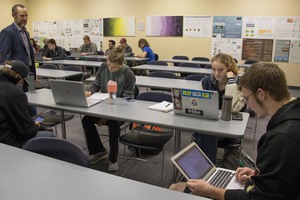FYI course teaches students to be skeptics

CHADRON – Students in Dr. Josh Ellis’ First Year Inquiry course learn to be skeptical of advertising, news, products and services. Ellis designed the three credit hour course (FYI 169AK) and offers it face-to-face each fall.
“I encourage students to watch for logical fallacies, and be wary of click bait and pseudo science,” Ellis said. “One false claim in the media can muddy the waters and take years to correct.”
In his discussion about weaponized lies, Ellis cites the 2016 example of “Pizzagate,” involving rumors spread to imply a connection between Democratic National Party leaders and a child sex ring tied to a pizza restaurant in Washington, D.C. It was eventually proven false.
Regarding social media interactions, Ellis challenges his students to avoid quarreling. He encourages them to instead figure out where posts by their friends and family members are coming from.
“‘Seek first to understand and then to be understood,’ is a concept from Stephen Covey that we explore in class. I encourage them to help the other person save face and convince them of their point of view rather than argue. Help them trip over the truth,” Ellis said. “Being humble and authentic are two things that will get you a long way. The more you know, the more you know you don’t know.”
Ellis draws on philosophical statements attributed to Socrates and Plato to foster critical thinking, one of the aims of the Essential Studies Program (ESP). He said he spends about the first two weeks of the class explaining the purpose of the ESP and the role of FYI.
As a natural lab for exercising critical thinking, he requires five introspective writing assignments on topics including cognitive biases, creating a life of meaning, exploring sources of resistance in ones life, and problem solving that all become a chapter in each student’s “Story of My Self-Construction.”
In addition to introspection, getting out and exploring campus is also part of the course. Ellis designed a scavenger hunt to help student teams meet faculty and staff and discover facilities they can use as resources throughout their career at CSC. He placed ammo boxes around campus after sending a notification to fellow employees so nobody would be alarmed. He gave students clues about the boxes’ whereabouts and placed a set of mission details for each team in the boxes.
The students were expected to follow directions and ultimately take a team selfie with each faculty or staff member who was the object of the mission.
“One week I put five dollars in each envelope and told them to do something nice for a student they didn’t know. A few bought a cup of coffee for someone in the library, and few just handed the money to a random student,” Ellis said.
To gain a deeper understanding of how to guard against deception, Ellis has students step into the shoes of deceivers using appeals to ethics, emotion and logic to market a fake product and develop a fake news video. Products the Fall 2017 class invented included a stomach Zoomba and learning pills.
William Reiter of Bellwood, Nebraska, said, as a result of the course, he learned to be skeptical of everything in a healthy way.
“This means you need to learn the facts before you believe something you have read. It also means you have to be open to both sides of the discussion,” Reiter said. “I like to have debates with my friends and family and Dr. Ellis has taught me how to handle these debates better than I did before. I now come more prepared to my debates and I am more open to listening what the other person has to say.”
Reiter said the group activities were fun and beneficial.
“I learned how to work with others which is a skill I will need. My group handled work distribution well. I encourage other students to take this course,” Reiter said.
Category: Campus News
